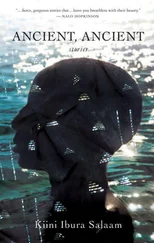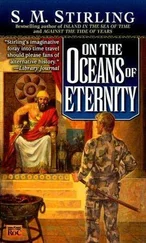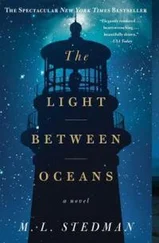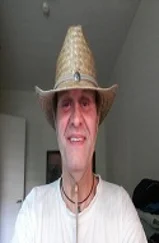Edna L. Toliver Elementary School was bounded by city streets on three sides. Beyond the street that ran behind the school, warehouses and then beyond, train tracks. It was the fall. There was nothing remarkable about this man, walking along the edge of the property. An adult, but how old was unknown to her. Tall with a slight gut that strained against whatever shirt he wore, or was hidden under a jacket of one sort or another. A gut, but thin looking. Thin arms swinging like a skeleton dancing in a cartoon. His hair was brown or black, and sometimes, in the right light had blond highlights and was slightly gray in places and with thick framed glasses.
The first time, she just looked up and noticed the man walking along the street behind the school slowly. He became singular in her mind as though God had paused the rest of the world and said, Look . After that, she saw him everywhere. Walking behind or next to the school, in department stores or outside of church, cutting through the old church cemetery next to the sanctuary, leaning against the obelisk, loafing on the steps of an apartment or entering the dark doorway of a pool hall. Sometimes he looks a little different, seemed to stand straighter or stoop. Seemed to lose and gain weight. Maybe he began to dye his hair. He sometimes wore glasses. And she only saw the man when Jacob was around. Only when Jacob careened around the playground, only when he tottered out of her reach, only then would Leah notice the man standing off in the distance or walking with his face turned away. She watched the man, her neck growing warm, birds swirling in the young sky.
“I don’t know how you work at a place like that. I’d get sick of all the stories. The excuses you know? These girls, they get in trouble and then they expect someone else to take care of their problems. You know? I mean, I know sometimes people need help, but when you keep having babies and you’ve got a cell phone and you’re texting and updating your status and shit, you know? I don’t know how you do it. But, I mean, it’s a good thing, but some people abuse it.”
That evening, over a meal, the solicitation for a donation was already forgotten.
“Leah,” Jacob said, looking out the window when they were supposed to be asleep. “Leah.”
“Don’t tell me there is someone in the yard because there’s not.”
“Okay,” Jacob said and giggled.
Can I love these children? Mrs. Shepherd wondered once while watching them run in the dry summer grass as she sipped iced tea from a plastic cup. The screaming and crying, the falling and bloody knees, the soiled pants and ruined mattresses, the death of any hope of just a moment of quiet as the two cannoned through the halls. Go outside! Go outside! Please, Christ Jesus, go outside! She kept an anthology of poetry from her freshman year of college in a drawer by her bed and would open it once in a while and read a few poems, always opening to the same places where the spine was broken, wondering why she underlined certain lines. When she was first pregnant with Leah, Mrs. Shepherd stopped working and didn’t go back to work until Leah was in high school. She got a realtor’s license and within a few years was making far more than her husband made as a public school teacher and administrator. They were comfortable. She lost the anthology in one of their moves.
At night, Mr. Shepherd embraced his wife and told her he loved her and she smiled to make him feel better, as though there was nothing wrong with them, nothing wrong with her, and she waited for him to let her go.
Can I love these children?
Standing at the window in the kitchen, putting away the old plastic cups that the family used for years, the lips chewed and uncomfortable now, she remembers having wondered that once and watched as the cups fell to the kitchen floor, slipping from her fingers.
Mr. Shepherd took his children to a matinee. Windows open in the car to spring air and there were new leaves on old trees. Backlit by early afternoon sun they gleamed light green. Jacob pointed out his favorite tree, a telephone pole by the elementary school. With a scab on his nose, he sat still and watched out the window, hoping to see a blue Bug. His hair, bleached on accident by their mother, swarmed his ears. Dashboard speakers crackled with the thud of drums. They thrilled. Leah stretched out across the back, her bare legs sticking to ripped vinyl seats spilling foam. An empty blue sky ribboned out behind the houses and water-towers. Windows sheared off sheets of the warm spring air and it spilled across her face. They walked into the dark of the theater. They were late. The movie had begun. They sat in the back row.
A ship on fire. A black horse’s head struggling against the black water. A boy on a beach. Yellow sun shining on him, hotter than it had on us. The boy does not speak. They run. They rest. They are alone.
The theater was full of other children. Ragged edges of their heads lit by the screen. They flickered. Though no sound came from the boy or the horse on the screen, a soft wordless flutter rose from the seats. Squeaks and moans, heavy throated laughs. Leah and Jacob sit in silence and watch the movie and listen to the other children.
The boy and horse flying across dunes, a mud yellow fort on the horizon, the sun setting, endless rays.
Later: “We saw a green fire and a whale and a skeleton and a person with two heads and a raccoon that was standing and screaming…” Nighttime and the windows exploded with rippling light. The squall without dim compared to the bellowing within from startled children pressing faces to plaster. A bending outside, a quaking of cracking, an impossibly deep sound that Leah assumed could only be the Earth being ripped in two.
The next morning, the children marveled at the limb that had crushed the car. “We could have been in there,” Jacob said, astonished at his luck. The shards found thereafter, saved for years, glinting bits slicing at bare toe, placed by Leah in a nook in magnolia roots as a reminder of their luck. Waves beat bones of crawling things to sand and dust and compress to limestone teeth that jut from the green jaw of green grass. Sea-shattered remnant and so too will these baby bones be. And here they are now, in the palm of Leah’s hand and hidden in her yard. Jacob asked for the pretty pieces and Leah said no because they were her shards. Years of glass.
“I don’t want to! I don’t want to go!” Jacob screwed his red face and beat white fists at empty air. Baby blue pleated shorts and slate blue sport coat and red tie. He hopped and gesticulated, face puffed-up like a scarlet balloon. “I’ll run away!” Where the cement cracked and brown sprigs of grass jutted up through, he stood, screamed and screamed, a high pitched voice ricocheting around the empty curves of St. Mildred’s Court, a voice that Leah was certain could be heard through all of Crow Station. He pitched a teary tantrum and his sister pleaded with him to not run away, which he threatened every Sunday when told it was time for church. No cars drove past. The deaf man across the street was not mowing. The world contained only the two of them, brother and sister, alone in the world, still but for the rustling of the spring’s newly born leaves in the branches of the ancient trees that bent over them, the only living things listening to them. “No, no. Please, don’t. Don’t. I will let you sleep in the bed by the door. I will give you a back scratch every night. I will pick up your toys.”
“All of them?”
“Yes.”
“How long?”
“A week.” He began to walk away. “Okay, a month.” He came home.
“Hell, no. That house ain’t haunted. That’s bullshit, but look, someone does live there. I mean I’ve seen him. A real small fellow. We were out with Jason and them and he wanted to see it, so we drove by and up the long drive to the door and Jason and his cousin were going to go in, but when we stopped the front door opened up and this little guy comes running out at the car and well, we just fucking booked it, and the guy was screaming and screaming and I looked back and he followed us most of the way down the street.”
Читать дальше












